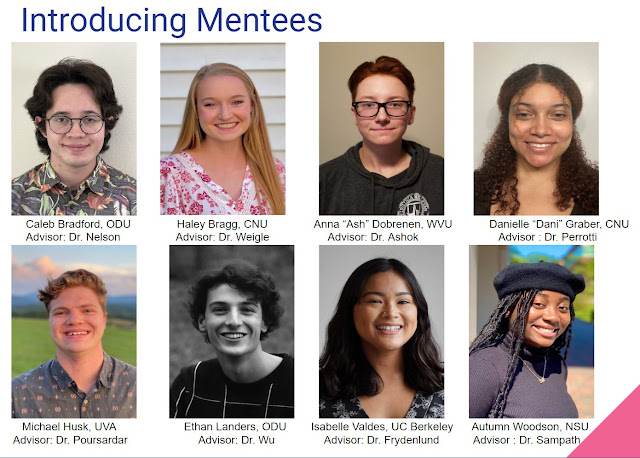2022-07-15: Disinformation Detection and Analytics REU Program - Mid Summer Presentations
1. Caleb Bradford (@calebkbradford) advised by Dr. Michael Nelson (@phonedude_mln)
The first presentation of the Mid-Summer Presentations of the @oducsreu program has started!@calebkbradford is now delivering his presentation on "Did they really tweet that?"@WebSciDL @oducs @ODUSCI pic.twitter.com/6Nw45pLVDB
— Yasasi (@Yasasi_Abey) July 8, 2022
2. Haley Bragg (@haleybragg17) advised by Dr. Michele C. Weigle (@weiglemc)
.@haleybragg17 from the @oducsreu summer 2022 program is now presenting her work on "Discovering the Traces of Disinformation on Instagram" at the Mid-Summer Presentations. @WebSciDL @oducs @ODUSCI pic.twitter.com/mQERsRDBY3
— Yasasi (@Yasasi_Abey) July 8, 2022
3. Ash Dobrenen (@Kat9951) advised by Dr. Vikas Ashok (@vikas_daveb)
.@Kat9951 from @oducsreu is delivering her presentation on "Protecting Blind Screen-Reader Users From Deceptive Content" at the Mid-Summer Presentations. @WebSciDL @NSF @oducs @ODUSCI pic.twitter.com/EyJ2fOfQfA
— Yasasi (@Yasasi_Abey) July 8, 2022
4. Michael Husk (@mhusk_3) advised by Dr. Faryaneh Poursardar (@Faryane)
At the Mid-Summer Presentations session of the @oducsreu program, now presenting @mhusk_3 of his work on "Fake Review Detection". In his work, Michael is trying to identify fake reviews posted on review websites such as Amazon. @WebSciDL @oducs @ODUSCI @NSF pic.twitter.com/Ikaqe7xO39
— Yasasi (@Yasasi_Abey) July 8, 2022
5. Dani Graber (@compsci_dani) advised by Dr. Anne Perrotti (@slpmichalek)
Next in @oducsreu mid-summer presentations, is "Disinformation About Mental Health on Tiktok” by @compsci_dani (mentor @slpmichalek ). How disinformation can lead to improper self-diagnosis including #ADHD, #DID, #Autism, and #Tourettes. @WebSciDL @NSF @ODUSCI @oducs pic.twitter.com/yjzpgSf7XW
— Bhanuka Mahanama (@mahanama94) July 8, 2022
6. Ethan Landers (@ethanlanders_) advised by Dr. Jian Wu (@fanchyna)
Now, @ethanlanders_ is presenting “An Assessment of Scientific Claim Verification Frameworks” (mentor @fanchyna) @oducsreu mid-summer presentations. The project attempts to detect misinformation in the scientific community, often hard to detect. @WebSciDL @NSF @ODUSCI @oducs pic.twitter.com/Doq26X9vMI
— Bhanuka Mahanama (@mahanama94) July 8, 2022
7. Isabelle Valdes (@isabellefv_) advised by Dr. Erika Frydenlund (@ErikaFrydenlund)
.@isabellefv_ is now presenting her study “Networks of Disinformation: Colombian Twitter and the Venezuelan Migration Crisis” (mentor @ErikaFrydenlund ) mid-summer presentation. @WebSciDL @NSF @ODUSCI @oducs pic.twitter.com/EHAYx3e3Jg
— Bhanuka Mahanama (@mahanama94) July 8, 2022
8. Autumn Woodson (@AWoods_n) advised by Dr. Sampath Jayarathna (@OpenMaze)
Final presentation @oducsreu: @AWoods_n presenting her study “Human Interaction With Fake News” (mentor @OpenMaze ). The study tries to characterize reading patterns using eye-tracking while interacting with fake news. @WebSciDL @NSF @ODUSCI @oducs pic.twitter.com/iAUnEK1cII
— Bhanuka Mahanama (@mahanama94) July 8, 2022


Comments
Post a Comment